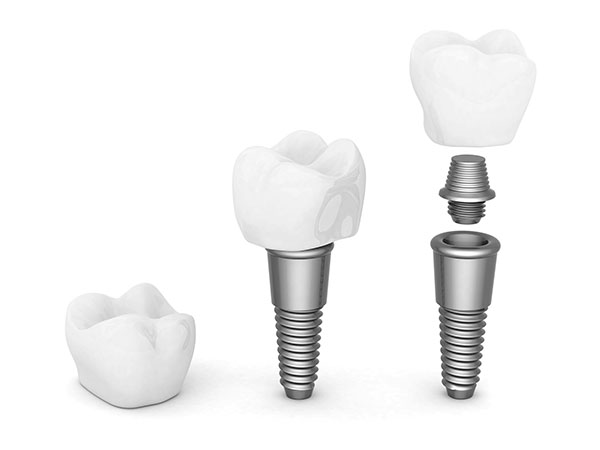What You Should Know About The Dental Implant Procedure
 What is the dental implant procedure?
What is the dental implant procedure?
A dental implant is a tiny prosthetic device placed into your jawbone under the gum line, in order to help replace a missing tooth or lost teeth. This dental implant procedure is what we use to place the implant and consists of several steps to ensure that you have the strongest, most stable dental implant placement. The procedure starts with a complete and very comprehensive examination. While there are very few factors that may preclude you from getting a dental implant, part of our job is to ensure that you have none of those factors and are a great candidate for dental implants. We do this by examining your mouth, taking a full oral history, and using dental imaging like x-rays and a CT scan to measure the density of your jawbone. If there are any infections, cavities, or other minor problems, we will want to clear those up before we proceed to the dental implant stage. During the dental implant procedure, we will be placing a tiny titanium screw into the jawbone. Once this has healed, we will use an abutment, or a small device that sticks up above the gum line, to connect to your new false tooth. This new tooth, also known as a dental crown, will be the only thing you will see and use. Meanwhile, the implant itself, which is the main focus of the dental implant procedure, will be working below the surface to ensure that your new replacement tooth remains stable and secure for a very long time.
During the dental implant procedure, why do you measure the jawbone so thoroughly?
The jawbone is the most critical part of the body when it comes to sustaining and supporting the dental implant. In order to do this, the jawbone has to have a level of density and bone mass, which provides strength. It also has to be able to sustain the oral surgery. In many senses, the jawbone is the foundation of your house, meaning if the ground cannot sustain the foundation, the entire house is weak. Unfortunately, one of the side-effects of tooth loss is that the jawbone starts to deteriorate. This happens through a perfectly natural process known as resorption. Our job is to make sure that the foundation into which we are placing the implant is secure and stable, which is why we take exceptional care to measure and examine the jawbone itself. The bottom line for you is that a weakened jawbone, or one that is not sufficiently dense, does not automatically preclude you from getting the dental implant procedure you need. It merely adds another dimension, the need for a bone graft.
How is the dental implant procedure impacted by the need for a bone graft?
In terms of the process, the only change is the time it takes for you to heal from the bone graft surgery. This is typically around six months, after which we will have a very strong and stable part into which we can place the dental implant.
Related Posts
Investing in dental implants can be the healthiest thing that you can do for your dental health. Replacing missing teeth is necessary. Dental implants are the gold standard in dental replacements. Knowing how to care for your new implants can improve your oral health for a long time. Here are some pointers that you must…
Dental implants are a popular and effective treatment option for missing teeth. However, it can be overwhelming to learn about the details of the entire process. In addition, it is normal to have questions about the procedure. This article will review the most commonly asked questions and help you determine if this procedure may be…
Many types of dental implants are available. There are also many ways to attach them to your jawbone and gums. Working with your dentist can determine the right implants. Here are the different types of dental implants that are right for your dental needs.These restorations have titanium rods that the dentist inserts into the jawbone.…
Studies show that dental implants remain the gold standard in dental restorations. These dental replacements are the most stable ones that you can get. It may be invasive, but once it heals well, you will have good dental function again. Here are the details about the process of getting dental implants.The dentist will examine the…
 What is
What is